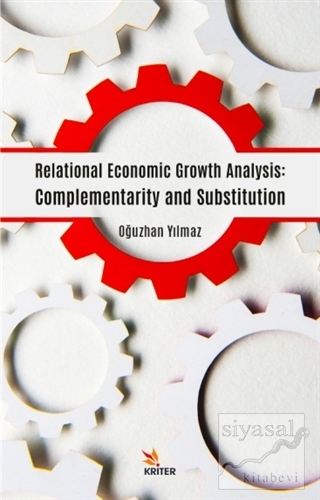
This book is about economic growth and development through a new way of analysis. It is a research that explains many phenomena seen in the growth process such as productivity, economic stagnation, under-investment, ineffectiveness of foreign aid, wage trends, factor flows and concentrations, technology adoption, and convergence by “relational analysis”.
Relational analysis is a general alternative analysis that focuses on the relationships between factors and uses their vital consequences to extract knowledge rather than ignore them artificially and fatally. It emphasizes that there are important interrelationships between factors such as complementarity, substitution, embodiment, directing, input-output, and facilitation. Taking into account the relations enable to get more complete and accurate answers to important questions, especially in applied works that require real predictions such as forecasting and policy formulation. The analysis can be fruitfully applied in any field, and as the growth analysis shows it fundamentally enriches the ideas, and protect from misleading assumptions.
In the book the readers will find:
- Origins and alternative definitions of complementarity and substitutions,
- Eleven implications of these relationships for economic growth and development,
- Many explanations and references for inferences regarding growth accounting, poverty traps and thresholds, multiple eqilibria, obsolescence, financial development, growth accelerations, imitations and barriers, and empirical anaysis.
The book is for anyone looking for an alternative way to learn about the basics of the growth process. Researchers, students, and staffs at universities and research institutions and other social scientists in government, business, international organizations should greatly benefit from reading the book.
This book is about economic growth and development through a new way of analysis. It is a research that explains many phenomena seen in the growth process such as productivity, economic stagnation, under-investment, ineffectiveness of foreign aid, wage trends, factor flows and concentrations, technology adoption, and convergence by “relational analysis”.
Relational analysis is a general alternative analysis that focuses on the relationships between factors and uses their vital consequences to extract knowledge rather than ignore them artificially and fatally. It emphasizes that there are important interrelationships between factors such as complementarity, substitution, embodiment, directing, input-output, and facilitation. Taking into account the relations enable to get more complete and accurate answers to important questions, especially in applied works that require real predictions such as forecasting and policy formulation. The analysis can be fruitfully applied in any field, and as the growth analysis shows it fundamentally enriches the ideas, and protect from misleading assumptions.
In the book the readers will find:
- Origins and alternative definitions of complementarity and substitutions,
- Eleven implications of these relationships for economic growth and development,
- Many explanations and references for inferences regarding growth accounting, poverty traps and thresholds, multiple eqilibria, obsolescence, financial development, growth accelerations, imitations and barriers, and empirical anaysis.
The book is for anyone looking for an alternative way to learn about the basics of the growth process. Researchers, students, and staffs at universities and research institutions and other social scientists in government, business, international organizations should greatly benefit from reading the book.





















